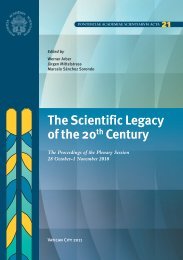Il natural desiderio di sapere - Pontifical Academy of Sciences
Il natural desiderio di sapere - Pontifical Academy of Sciences
Il natural desiderio di sapere - Pontifical Academy of Sciences
Create successful ePaper yourself
Turn your PDF publications into a flip-book with our unique Google optimized e-Paper software.
ON THE NATURAL DESIRE FOR KNOWLEDGE 155more and produce such parts in more abundance, that it will thus notremain sterile from ignorance, defect or ineptitude <strong>of</strong> its cultivators.It will also be very useful to the public that in this manner not only saidacademics among themselves but also all the other literati will be broughttogether, either by friendship or by exchange <strong>of</strong> informations, and withcommerce and correspondence; 131 because in this way they will better satisfytheir debt, and they will be better known by all, so that everyone canhave testimony <strong>of</strong> their knowledge and avail themselves <strong>of</strong> it in any placewhatsoever, and especially princes and governments. Who, wishing to providetheir Universities or cities or courts with <strong>di</strong>stinguished literati who canpropagate the sciences among their au<strong>di</strong>tors and lay out for them the bestconcepts and the essence itself, while they take them in relation and favor<strong>of</strong> this one or that one, it is certain that they cannot be very sure <strong>of</strong> goodand sufficient servitude nor <strong>of</strong> successfully obtaining their intent. We havein the farcical Lucianus 132 the serious way in which the emperors <strong>of</strong> his timeused to elect the most learned in any philosophical sect, who, being wellremunerated, conserved it and propagated it, instructing in it a good number<strong>of</strong> au<strong>di</strong>tors. Nor was the <strong>di</strong>versity <strong>of</strong> the ways damaging to philosophizingbut very useful, as continuously measuring themselves and exercisingthemselves against each other, the better they were able to refine andsharpen their intellects, and thus free they then seized hold <strong>of</strong> what bestsuited them without being obliged to swear to the sayings <strong>of</strong> the preceptor.133 In each sect, therefore, upon the death <strong>of</strong> the maestro, we see that thenew maestro was deputized by expert judges therein after having had thecan<strong>di</strong>dates engage in long <strong>di</strong>sputes and exercises with each other, thus comingto know the most excellent and meritorious. Such means, although nottotally sure due to the quickness and cheek that usually weigh more thanknowledge in public <strong>di</strong>sputations, was nevertheless much better than thein<strong>di</strong>cations <strong>of</strong> prominent in<strong>di</strong>viduals and hearsay <strong>of</strong> such fallacious fame.But here 134 their superiors, by report <strong>of</strong> the well-known academics and bythe works themselves, will be able to have certainty <strong>of</strong> the value <strong>of</strong> the subjectswith trial and earnest such that there will remain no doubt, so thatthey will take from them copious and certain fruit to the greater propagation<strong>of</strong> letters and scholars and their service, or better, they will be able tohave them promptly in any place whatever; nor indeed will it happen as it131 With personal and epistolary reports.132 Eunuchus, 3.133 Cf. Horace, Epist., I, I, v. 14.134 Here, that is, where the Accademia dei Lincei has been instituted.
















